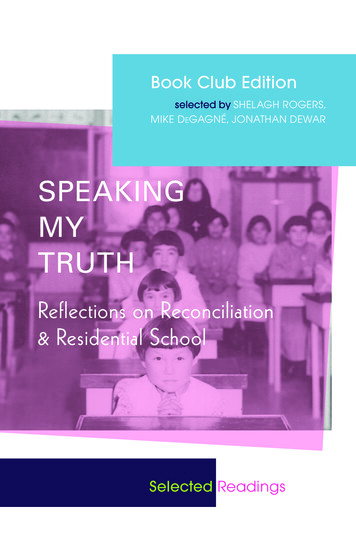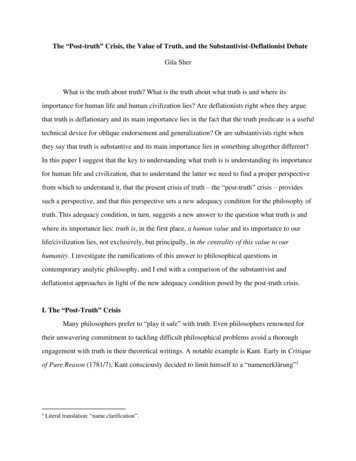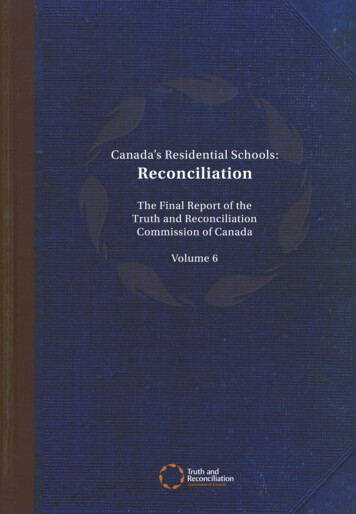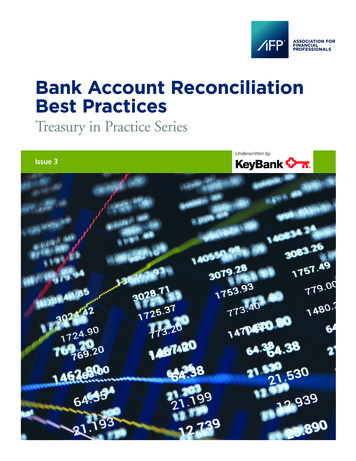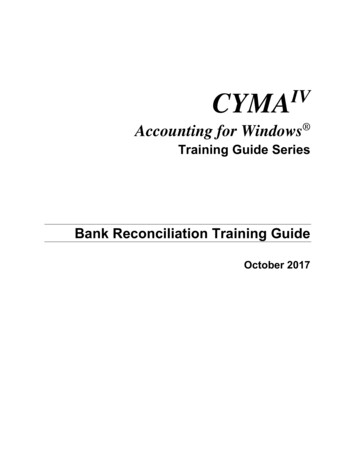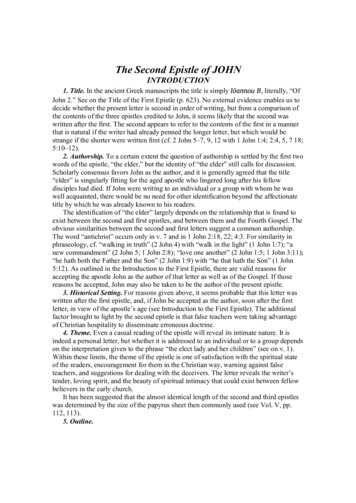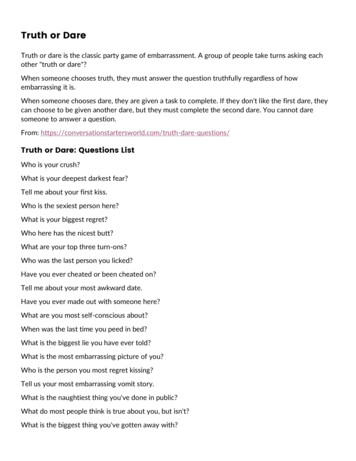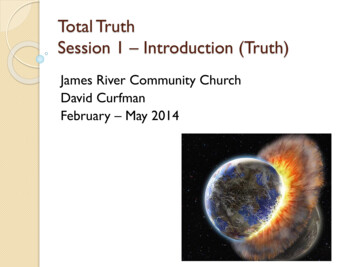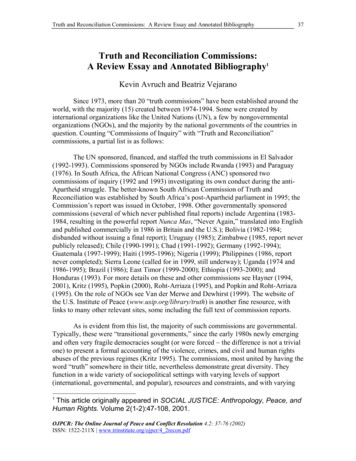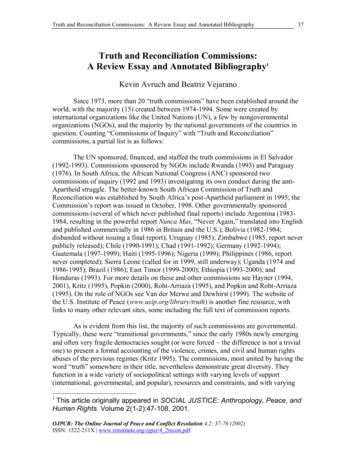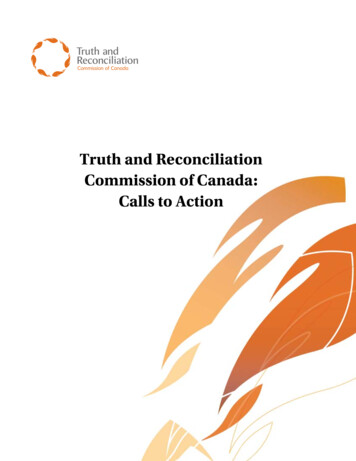
Transcription
Truth and ReconciliationCommission of Canada:Calls to Action
Truth and ReconciliationCommission of Canada:Calls to Action
This report is in the public domain. Anyone may, without charge or request forpermission, reproduce all or part of this report.2015Truth and Reconciliation Commission of Canada, 20121500–360 Main StreetWinnipeg, ManitobaR3C 3Z3Telephone: (204) 984-5885Toll Free: 1-888-872-5554 (1-888-TRC-5554)Fax: (204) 984-5915E-mail: info@trc.caWebsite: www.trc.ca
1Calls to ActionIn order to redress the legacy of residential schools andpublish annual reports on the number of Aboriginaladvance the process of Canadian reconciliation, the Truthchildren (First Nations, Inuit, and Métis) who are inand Reconciliation Commission makes the following calls tocare, compared with non-Aboriginal children, as wellaction.as the reasons for apprehension, the total spending onpreventive and care services by child-welfare agencies,and the effectiveness of various interventions.Legacy3.Child welfare1.We call upon the federal, provincial, territorial, andJordan’s Principle.4.We call upon the federal government to enact AboriginalAboriginal governments to commit to reducing thechild-welfare legislation that establishes nationalnumber of Aboriginal children in care by:standards for Aboriginal child apprehension andcustody cases and includes principles that:i. Monitoring and assessing neglect investigations.i. Affirm the right of Aboriginal governments toii. Providing adequate resources to enable Aboriginalestablish and maintain their own child-welfarecommunities and child-welfare organizations toagencies.keep Aboriginal families together where it is safe todo so, and to keep children in culturally appropriateii. Require all child-welfare agencies and courts to takeenvironments, regardless of where they reside.the residential school legacy into account in theirdecision making.iii. Ensuring that social workers and others whoconduct child-welfare investigations are properlyiii. Establish, as an important priority, a requirementeducated and trained about the history and impactsthat placements of Aboriginal children intoof residential schools.temporary and permanent care be culturallyappropriate.iv. Ensuring that social workers and others whoconduct child-welfare investigations are properly5.We call upon the federal, provincial, territorial,educated and trained about the potential forand Aboriginal governments to develop culturallyAboriginal communities and families to provideappropriate parenting programs for Aboriginal families.more appropriate solutions to family healing.v. Requiring that all child-welfare decision makersconsider the impact of the residential schoolEducation6.We call upon the federal government, in collaborationwith the provinces and territories, to prepare andWe call upon the Government of Canada to repealSection 43 of the Criminal Code of Canada.experience on children and their caregivers.2.We call upon all levels of government to fully implement7.We call upon the federal government to developwith Aboriginal groups a joint strategy to eliminate
2 Truth and Reconciliation Commission of Canadaeducational and employment gaps between Aboriginaland non-Aboriginal Canadians.8.We call upon the federal government to eliminate thediscrepancy in federal education funding for First9.14. We call upon the federal government to enact anAboriginal Languages Act that incorporates thefollowing principles:i. Aboriginal languages are a fundamental and valuedNations children being educated on reserves and thoseelement of Canadian culture and society, and thereFirst Nations children being educated off reserves.is an urgency to preserve them.We call upon the federal government to prepare andpublish annual reports comparing funding for theeducation of First Nations children on and off reserves,as well as educational and income attainments ofAboriginal peoples in Canada compared with nonAboriginal people.10. We call on the federal government to draft newAboriginal education legislation with the fullparticipation and informed consent of Aboriginalii. Aboriginal language rights are reinforced by theTreaties.iii. The federal government has a responsibility toprovide sufficient funds for Aboriginal-languagerevitalization and preservation.iv. The preservation, revitalization, and strengtheningof Aboriginal languages and cultures are bestmanaged by Aboriginal people and communities.peoples. The new legislation would include av. Funding for Aboriginal language initiatives mustcommitment to sufficient funding and wouldreflect the diversity of Aboriginal languages.incorporate the following principles:i. Providing sufficient funding to close identified15. We call upon the federal government to appoint, inconsultation with Aboriginal groups, an Aboriginaleducational achievement gaps within oneLanguages Commissioner. The commissioner shouldgeneration.help promote Aboriginal languages and report on theii. Improving education attainment levels and successrates.iii. Developing culturally appropriate curricula.iv. Protecting the right to Aboriginal languages,including the teaching of Aboriginal languages ascredit courses.v. Enabling parental and community responsibility,adequacy of federal funding of Aboriginal-languagesinitiatives.16. We call upon post-secondary institutions to createuniversity and college degree and diploma programs inAboriginal languages.17. We call upon all levels of government to enableresidential school Survivors and their families to reclaimnames changed by the residential school system bycontrol, and accountability, similar to what parentswaiving administrative costs for a period of five yearsenjoy in public school systems.for the name-change process and the revision of officialvi. Enabling parents to fully participate in the educationof their children.identity documents, such as birth certificates, passports,driver’s licenses, health cards, status cards, and socialinsurance numbers.vii. Respecting and honouring Treaty relationships.11. We call upon the federal government to provideadequate funding to end the backlog of First Nationsstudents seeking a post-secondary education.12. We call upon the federal, provincial, territorial,and Aboriginal governments to develop culturallyappropriate early childhood education programs forAboriginal families.Language and culture13. We call upon the federal government to acknowledgethat Aboriginal rights include Aboriginal languagerights.Health18. We call upon the federal, provincial, territorial, andAboriginal governments to acknowledge that the currentstate of Aboriginal health in Canada is a direct resultof previous Canadian government policies, includingresidential schools, and to recognize and implementthe health-care rights of Aboriginal people as identifiedin international law, constitutional law, and under theTreaties.19. We call upon the federal government, in consultationwith Aboriginal peoples, to establish measurable goalsto identify and close the gaps in health outcomes
Calls to Action 3between Aboriginal and non-Aboriginal communities,Royal Canadian Mounted Police to investigate crimes inand to publish annual progress reports and assess long-which the government has its own interest as a potentialterm trends. Such efforts would focus on indicators suchor real party in civil litigation.as: infant mortality, maternal health, suicide, mentalhealth, addictions, life expectancy, birth rates, infantand child health issues, chronic diseases, illness andinjury incidence, and the availability of appropriatehealth services.20. In order to address the jurisdictional disputesconcerning Aboriginal people who do not reside onreserves, we call upon the federal government torecognize, respect, and address the distinct health needsof the Métis, Inuit, and off-reserve Aboriginal peoples.21. We call upon the federal government to provide26. We call upon the federal, provincial, and territorialgovernments to review and amend their respectivestatutes of limitations to ensure that they conform to theprinciple that governments and other entities cannotrely on limitation defences to defend legal actions ofhistorical abuse brought by Aboriginal people.27. We call upon the Federation of Law Societies of Canadato ensure that lawyers receive appropriate culturalcompetency training, which includes the historyand legacy of residential schools, the United NationsDeclaration on the Rights of Indigenous Peoples, Treatiessustainable funding for existing and new Aboriginaland Aboriginal rights, Indigenous law, and Aboriginal–healing centres to address the physical, mental,Crown relations. This will require skills-based trainingemotional, and spiritual harms caused by residentialin intercultural competency, conflict resolution, humanschools, and to ensure that the funding of healingrights, and anti-racism.centres in Nunavut and the Northwest Territories is apriority.22. We call upon those who can effect change within the28. We call upon law schools in Canada to require all lawstudents to take a course in Aboriginal people and thelaw, which includes the history and legacy of residentialCanadian health-care system to recognize the valueschools, the United Nations Declaration on the Rightsof Aboriginal healing practices and use them in theof Indigenous Peoples, Treaties and Aboriginal rights,treatment of Aboriginal patients in collaboration withIndigenous law, and Aboriginal–Crown relations.Aboriginal healers and Elders where requested byThis will require skills-based training in interculturalAboriginal patients.competency, conflict resolution, human rights, and anti-23. We call upon all levels of government to:i. Increase the number of Aboriginal professionalsworking in the health-care field.ii. Ensure the retention of Aboriginal health-careproviders in Aboriginal communities.iii. Provide cultural competency training for all healthcare professionals.24. We call upon medical and nursing schools in Canadato require all students to take a course dealing withAboriginal health issues, including the history andlegacy of residential schools, the United Nationsracism.29. We call upon the parties and, in particular, the federalgovernment, to work collaboratively with plaintiffs notincluded in the Indian Residential Schools SettlementAgreement to have disputed legal issues determinedexpeditiously on an agreed set of facts.30. We call upon federal, provincial, and territorialgovernments to commit to eliminating theoverrepresentation of Aboriginal people in custody overthe next decade, and to issue detailed annual reportsthat monitor and evaluate progress in doing so.31. We call upon the federal, provincial, and territorialDeclaration on the Rights of Indigenous Peoples, Treatiesgovernments to provide sufficient and stable fundingand Aboriginal rights, and Indigenous teachings andto implement and evaluate community sanctions thatpractices. This will require skills-based training inwill provide realistic alternatives to imprisonment forintercultural competency, conflict resolution, humanAboriginal offenders and respond to the underlyingrights, and anti-racism.causes of offending.Justice25. We call upon the federal government to establish awritten policy that reaffirms the independence of the32. We call upon the federal government to amend theCriminal Code to allow trial judges, upon giving reasons,to depart from mandatory minimum sentences andrestrictions on the use of conditional sentences.
4 Truth and Reconciliation Commission of Canada33. We call upon the federal, provincial, and territorial40. We call on all levels of government, in collaborationgovernments to recognize as a high priority the need towith Aboriginal people, to create adequately fundedaddress and prevent Fetal Alcohol Spectrum Disorderand accessible Aboriginal-specific victim programs and(FASD), and to develop, in collaboration with Aboriginalservices with appropriate evaluation mechanisms.people, FASD preventive programs that can be deliveredin a culturally appropriate manner.34. We call upon the governments of Canada, the provinces,41. We call upon the federal government, in consultationwith Aboriginal organizations, to appoint a publicinquiry into the causes of, and remedies for, theand territories to undertake reforms to the criminaldisproportionate victimization of Aboriginal women andjustice system to better address the needs of offendersgirls. The inquiry’s mandate would include:with Fetal Alcohol Spectrum Disorder (FASD),including:i. Providing increased community resources andpowers for courts to ensure that FASD is properlydiagnosed, and that appropriate communitysupports are in place for those with FASD.ii. Enacting statutory exemptions from mandatoryminimum sentences of imprisonment for offendersaffected by FASD.iii. Providing community, correctional, and parolei. Investigation into missing and murdered Aboriginalwomen and girls.ii. Links to the intergenerational legacy of residentialschools.42. We call upon the federal, provincial, and territorialgovernments to commit to the recognition andimplementation of Aboriginal justice systems in amanner consistent with the Treaty and Aboriginalrights of Aboriginal peoples, the Constitution Act, 1982,and the United Nations Declaration on the Rights ofresources to maximize the ability of people withIndigenous Peoples, endorsed by Canada in NovemberFASD to live in the community.2012.iv. Adopting appropriate evaluation mechanisms tomeasure the effectiveness of such programs andensure community safety.Reconciliationbarriers to the creation of additional Aboriginal healingCanadian Governments and the United NationsDeclaration on the Rights of Indigenous Peoplelodges within the federal correctional system.43. We call upon federal, provincial, territorial, and35. We call upon the federal government to eliminate36. We call upon the federal, provincial, and territorialgovernments to work with Aboriginal communities toprovide culturally relevant services to inmates on issuessuch as substance abuse, family and domestic violence,municipal governments to fully adopt and implementthe United Nations Declaration on the Rights ofIndigenous Peoples as the framework for reconciliation.44. We call upon the Government of Canada to developand overcoming the experience of having been sexuallya national action plan, strategies, and other concreteabused.measures to achieve the goals of the United Nations37. We call upon the federal government to provide moresupports for Aboriginal programming in halfway housesand parole services.38. We call upon the federal, provincial, territorial, andDeclaration on the Rights of Indigenous Peoples.Royal Proclamation and Covenantof Reconciliation45. We call upon the Government of Canada, on behalf ofAboriginal governments to commit to eliminating theall Canadians, to jointly develop with Aboriginal peoplesoverrepresentation of Aboriginal youth in custody overa Royal Proclamation of Reconciliation to be issued bythe next decade.the Crown. The proclamation would build on the Royal39. We call upon the federal government to develop aProclamation of 1763 and the Treaty of Niagara of 1764,national plan to collect and publish data on the criminaland reaffirm the nation-to-nation relationship betweenvictimization of Aboriginal people, including dataAboriginal peoples and the Crown. The proclamationrelated to homicide and family violence victimization.would include, but not be limited to, the followingcommitments:
Calls to Action 5i. Repudiate concepts used to justify European47. We call upon federal, provincial, territorial, andsovereignty over Indigenous lands and peoples suchmunicipal governments to repudiate concepts used toas the Doctrine of Discovery and terra nullius.justify European sovereignty over Indigenous peoplesii. Adopt and implement the United NationsDeclaration on the Rights of Indigenous Peoples asthe framework for reconciliation.and lands, such as the Doctrine of Discovery and terranullius, and to reform those laws, government policies,and litigation strategies that continue to rely on suchconcepts.iii. Renew or establish Treaty relationships based onand shared responsibility for maintaining thoseSettlement Agreement Parties and the UnitedNations Declaration on the Rights of Indigenous Peoplesrelationships into the future.48. We call upon the church parties to the Settlementprinciples of mutual recognition, mutual respect,iv. Reconcile Aboriginal and Crown constitutionaland legal orders to ensure that Aboriginal peoplesare full partners in Confederation, including therecognition and integration of Indigenous laws andlegal traditions in negotiation and implementationprocesses involving Treaties, land claims, and otherconstructive agreements.46. We call upon the parties to the Indian ResidentialSchools Settlement Agreement to develop and signa Covenant of Reconciliation that would identifyprinciples for working collaboratively to advanceAgreement, and all other faith groups and interfaithsocial justice groups in Canada who have not alreadydone so, to formally adopt and comply with theprinciples, norms, and standards of the United NationsDeclaration on the Rights of Indigenous Peoples as aframework for reconciliation. This would include, butnot be limited to, the following commitments:i. Ensuring that their institutions, policies, programs,and practices comply with the United NationsDeclaration on the Rights of Indigenous Peoples.ii. Respecting Indigenous peoples’ right to self-reconciliation in Canadian society, and that woulddetermination in spiritual matters, includinginclude, but not be limited to:the right to practise, develop, and teach theiri. Reaffirmation of the parties’ commitment toown spiritual and religious traditions, customs,reconciliation.ii. Repudiation of concepts used to justify Europeansovereignty over Indigenous lands and peoples,such as the Doctrine of Discovery and terra nullius,and the reformation of laws, governance structures,and policies within their respective institutions thatcontinue to rely on such concepts.iii. Full adoption and implementation of the UnitedNations Declaration on the Rights of Indigenousand ceremonies, consistent with Article 12:1 ofthe United Nations Declaration on the Rights ofIndigenous Peoples.iii. Engaging in ongoing public dialogue and actions tosupport the United Nations Declaration on the Rightsof Indigenous Peoples.iv. Issuing a statement no later than March 31, 2016,from all religious denominations and faith groups,as to how they will implement the United NationsPeoples as the framework for reconciliation.Declaration on the Rights of Indigenous Peoples.iv. Support for the renewal or establishment of49. We call upon all religious denominations and faithTreaty relationships based on principles ofmutual recognition, mutual respect, and sharedresponsibility for maintaining those relationshipsinto the future.groups who have not already done so to repudiateconcepts used to justify European sovereignty overIndigenous lands and peoples, such as the Doctrine ofDiscovery and terra nullius.Agreement to sign onto the Covenant ofEquity for Aboriginal Peoplein the Legal SystemReconciliation.50. In keeping with the United Nations Declaration onv. Enabling those excluded from the Settlementvi. Enabling additional parties to sign onto theCovenant of Reconciliation.the Rights of Indigenous Peoples, we call upon thefederal government, in collaboration with Aboriginalorganizations, to fund the establishment of Indigenouslaw institutes for the development, use, and
6 Truth and Reconciliation Commission of Canadaunderstanding of Indigenous laws and access to justiceiv. Promote public dialogue, public/privatein accordance with the unique cultures of Aboriginalpartnerships, and public initiatives forpeoples in Canada.reconciliation.51. We call upon the Government of Canada, as an54. We call upon the Government of Canada to provideobligation of its fiduciary responsibility, to develop amulti-year funding for the National Council forpolicy of transparency by publishing legal opinions itReconciliation to ensure that it has the financial, human,develops and upon which it acts or intends to act, inand technical resources required to conduct its work,regard to the scope and extent of Aboriginal and Treatyincluding the endowment of a National Reconciliationrights.Trust to advance the cause of reconciliation.52. We call upon the Government of Canada, provincial55. We call upon all levels of government to provide annualand territorial governments, and the courts to adopt thereports or any current data requested by the Nationalfollowing legal principles:Council for Reconciliation so that it can report on thei. Aboriginal title claims are accepted once theAboriginal claimant has established occupation overa particular territory at a particular point in time.ii. Once Aboriginal title has been established, theburden of proving any limitation on any rightsarising from the existence of that title shifts to theparty asserting such a limitation.National Council for Reconciliation53. We call upon the Parliament of Canada, in consultationand collaboration with Aboriginal peoples, toenact legislation to establish a National Council forReconciliation. The legislation would establish thecouncil as an independent, national, oversight bodyprogress towards reconciliation. The reports or datawould include, but not be limited to:i. The number of Aboriginal children—including Métisand Inuit children—in care, compared with nonAboriginal children, the reasons for apprehension,and the total spending on preventive and careservices by child-welfare agencies.ii. Comparative funding for the education of FirstNations children on and off reserves.iii. The educational and income attainments ofAboriginal peoples in Canada compared with nonAboriginal people.iv. Progress on closing the gaps between Aboriginal andwith membership jointly appointed by the Governmentnon-Aboriginal communities in a number of healthof Canada and national Aboriginal organizations, andindicators such as: infant mortality, maternal health,consisting of Aboriginal and non-Aboriginal members.suicide, mental health, addictions, life expectancy,Its mandate would include, but not be limited to, thebirth rates, infant and child health issues, chronicfollowing:diseases, illness and injury incidence, and thei. Monitor, evaluate, and report annually to Parliamentand the people of Canada on the Government ofavailability of appropriate health services.v. Progress on eliminating the overrepresentation ofCanada’s post-apology progress on reconciliationAboriginal children in youth custody over the nextto ensure that government accountability fordecade.reconciling the relationship between Aboriginalvi. Progress on reducing the rate of criminalpeoples and the Crown is maintained in the comingvictimization of Aboriginal people, includingyears.data related to homicide and family violenceii. Monitor, evaluate, and report to Parliament and thepeople of Canada on reconciliation progress acrossvictimization and other crimes.vii. Progress on reducing the overrepresentation ofall levels and sectors of Canadian society, includingAboriginal people in the justice and correctionalthe implementation of the Truth and Reconciliationsystems.Commission of Canada’s Calls to Action.iii. Develop and implement a multi-year National56. We call upon the prime minister of Canada to formallyrespond to the report of the National Council forAction Plan for Reconciliation, which includesReconciliation by issuing an annual “State of Aboriginalresearch and policy development, public educationPeoples” report, which would outline the government’sprograms, and resources.plans for advancing the cause of reconciliation.
Calls to Action 7Professional Development andTraining for Public Servantsii. Community-controlled culture- and language-57. We call upon federal, provincial, territorial, andiii. Community-controlled education and relationship-municipal governments to provide education to publicservants on the history of Aboriginal peoples, includingthe history and legacy of residential schools, the UnitedNations Declaration on the Rights of Indigenous Peoples,Treaties and Aboriginal rights, Indigenous law, andAboriginal–Crown relations. This will require skillsbased training in intercultural competency, conflictresolution, human rights, and anti-racism.revitalization projects.building projects.iv. Regional dialogues for Indigenous spiritual leadersand youth to discuss Indigenous spirituality, selfdetermination, and reconciliation.Education for reconciliation62. We call upon the federal, provincial, and territorialgovernments, in consultation and collaboration withChurch Apologies and ReconciliationSurvivors, Aboriginal peoples, and educators, to:58. We call upon the Pope to issue an apology to Survivors,i. Make age-appropriate curriculum on residentialtheir families, and communities for the Roman Catholicschools, Treaties, and Aboriginal peoples’ historicalChurch’s role in the spiritual, cultural, emotional,and contemporary contributions to Canada aphysical, and sexual abuse of First Nations, Inuit, andmandatory education requirement for KindergartenMétis children in Catholic-run residential schools. Weto Grade Twelve students.call for that apology to be similar to the 2010 apologyissued to Irish victims of abuse and to occur within oneyear of the issuing of this Report and to be delivered bythe Pope in Canada.59. We call upon church parties to the SettlementAgreement to develop ongoing education strategiesto ensure that their respective congregations learnabout their church’s role in colonization, the historyand legacy of residential schools, and why apologies toii. Provide the necessary funding to post-secondaryinstitutions to educate teachers on how to integrateIndigenous knowledge and teaching methods intoclassrooms.iii. Provide the necessary funding to Aboriginal schoolsto utilize Indigenous knowledge and teachingmethods in classrooms.iv. Establish senior-level positions in government at theformer residential school students, their families, andassistant deputy minister level or higher dedicated tocommunities were necessary.Aboriginal content in education.60. We call upon leaders of the church parties to the63. We call upon the Council of Ministers of Education,Settlement Agreement and all other faiths, inCanada to maintain an annual commitment tocollaboration with Indigenous spiritual leaders,Aboriginal education issues, including:Survivors, schools of theology, seminaries, and otheri. Developing and implementing Kindergarten toreligious training centres, to develop and teachGrade Twelve curriculum and learning resourcescurriculum for all student clergy, and all clergy andon Aboriginal peoples in Canadian history, and thestaff who work in Aboriginal communities, on the needhistory and legacy of residential schools.to respect Indigenous spirituality in its own right, thehistory and legacy of residential schools and the rolesof the church parties in that system, the history andlegacy of religious conflict in Aboriginal families andcommunities, and the responsibility that churches haveto mitigate such conflicts and prevent spiritual violence.61. We call upon church parties to the SettlementAgreement, in collaboration with Survivors andrepresentatives of Aboriginal organizations, to establishpermanent funding to Aboriginal people for:i. Community-controlled healing and reconciliationprojects.ii. Sharing information and best practices on teachingcurriculum related to residential schools andAboriginal history.iii. Building student capacity for interculturalunderstanding, empathy, and mutual respect.iv. Identifying teacher-training needs relating to theabove.64. We call upon all levels of government that providepublic funds to denominational schools to requiresuch schools to provide an education on comparativereligious studies, which must include a segment on
8 Truth and Reconciliation Commission of CanadaAboriginal spiritual beliefs and practices developed incollaboration with Aboriginal Elders.65. We call upon the federal government, through the SocialSciences and Humanities Research Council, and incollaboration with Aboriginal peoples, post-secondaryinstitutions and educators, and the National Centre forTruth and Reconciliation and its partner institutions, toestablish a national research program with multi-yearfunding to advance understanding of reconciliation.Youth Programs66. We call upon the federal government to establish multiyear funding for community-based youth organizationsto deliver programs on reconciliation, and establishi. Determine the level of compliance with the UnitedNations Declaration on the Rights of IndigenousPeoples and the United Nations Joinet-OrentlicherPrinciples, as related to Aboriginal peoples’inalienable right to know the truth about whathappened and why, with regard to human rightsviolations committed against them in the residentialschools.ii. Produce a report with recommendations for fullimplementation of these international mechanismsas a reconciliation framework for Canadian archives.Missing Children and Burial Information71. We call upon all chief coroners and provincial vitala national network to share information and beststatistics agencies that have not provided to the Truthpractices.and Reconciliation Commission of Canada theirMuseums and Archives67. We call upon the federal government to provide fundingto the Canadian Museums Association to undertake, incollaboration with Aboriginal peoples, a national reviewof museum policies and best practices to determine thelevel of compliance with the United Nations Declarationon the Rights of Indigenous Peoples and to makerecommendations.68. We call upon the federal government, in collaborationwith Aboriginal peoples, and the Canadian
3. We call upon all levels of government to fully implement Jordan's Principle. 4. We call upon the federal government to enact Aboriginal child-welfare legislation that establishes national standards for Aboriginal child apprehension and custody cases and includes principles that: i. Affirm the right of Aboriginal governments to
